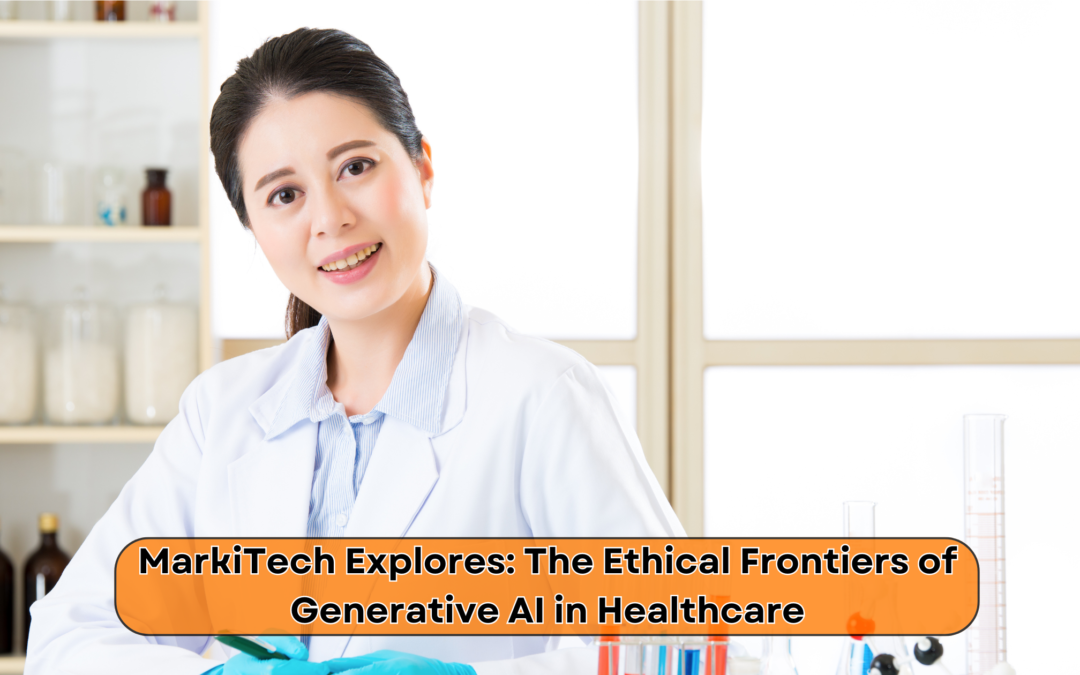Image Credit: Canva
Key Takeaways
- Generative AI in Healthcare – the sub-sector of AI that allows users to create written, audio, and visual content – has, by its very nature, become a game-changer that beats all game-changers. We cannot predict the impact it will have on the labour force, the economy, and society in general. But we do know, already, that its integration into healthcare offers tremendous potential. That said, we would be best served conducting a careful analysis of the ethical considerations, including patient autonomy, privacy, equity, and accountability.
- As AI technologies become even more integrated into healthcare, informed consent will need to be expanded to account for all the delicate nuances of AI applications, ensuring patients are fully aware of how their data is used and the implications thereof.
- To ensure universal access to the benefits of using Generative AI in healthcare, we will need to make serious and concerted efforts to eliminate disparities and ensure these technologies do not further widen the existing gaps in healthcare accessibility.
- Establishing clear accountability frameworks and ensuring transparency in the decision-making processes of AI systems are essential for building trust, facilitating improvements, and upholding ethical standards for Generative AI in healthcare.
Introduction
I woke up yesterday, and the buzz was all about Will Smith wiping the floor with robots running on AI; the human was still ascendant. But by the time I sat down to dinner, M3gan the AI-driven doll was already writing up the script of my creepy nightmares. That’s the negative media hype. But in the real world, Artificial Intelligence (AI) has been muscling up quietly and rapidly transforming industries and economic sectors all across the spectrum.
While the integration of AI technologies in the healthcare sector is causing a very noticeable seismic impact, the real game changer that – I dare say – is introducing disorienting new concepts is Generative AI (Gen AI). This new tech, Gen AI, is not an improvement; it’s not a new level of development. It is a whole new business paradigm; I know I love saying this, but it is a “fantastic point of view”. The who-does-what thought process goes out with the paper shredder. No paper; no shredder; no person.
Gen AI stands out for its potential to revolutionize medical diagnostics, treatment planning, patient care, and more. And that is exactly why it is so very crucial to grab a coffee, lean back in your seat, and truly reflect on the ethical implications that accompany such a hugely transformative technology. In this blog, we will explore the moral implications of using Generative AI in healthcare, and try to appreciate its benefits while addressing the ethical considerations of using a technology that is not, hand on heart, fully understood, neither by its developers, nor its users, and most certainly not those touched most intimately by it – thre patients.
Unveiling Generative AI in Healthcare
Generative AI, in the context of healthcare, refers to the subset of artificial intelligence technologies that can generate new data, including text, images, and even simulations, based on the patterns it learns from existing data. This capability opens a world of possibilities for personalized medicine, predictive diagnostics, and even the creation of synthetic data for research purposes. From generating realistic medical images for training purposes to simulating patient responses to various treatment plans, Generative AI holds the promise of significantly enhancing medical care and research.
The Ethical Compass: Guiding Principles
As we try to become comfortable with this new operational paradigm we will need to define a new set of guiding ethical principles that complement the features of this paradigm. These principles help ensure that the deployment of Generative AI in healthcare not only advances medical science but does so in a manner that is respectful, equitable, and just. Let’s examine the details of some of these key ethical considerations:
Patient Autonomy and Consent
At the heart of medical ethics is the principle of patient autonomy. This principle becomes even more critical when we introduce AI into the equation. The philosophy of informed consent will need to evolve in parallel with Gen AI to account for all its nuances ensuring patients understand how their data might be used, the potential outcomes of AI-generated recommendations, and the degree of human oversight necessitated.
Privacy and Data Security
Gen AI’s reliance on vast datasets highlights the importance of robust data protection measures. Ensuring the confidentiality and integrity of patient data is paramount, necessitating stringent security protocols and transparent data governance policies.
Equity and Accessibility
The benefits of AI in healthcare should be accessible to all, not just a privileged few. This requires deliberate efforts to address any potential disparities in access to medical services that may arise due to the application of AI technologies, ensuring that these technologies do not exacerbate existing healthcare inequities.
Accountability and Transparency
Who is responsible when AI makes a mistake? Clear accountability frameworks need to be established, alongside mechanisms for transparent decision-making processes. This transparency is crucial not only for building trust among healthcare professionals and patients but also for facilitating the continuous improvement of AI systems. At the end of the day, if a situation arises that requires legal intervention, rules must already exist to identify the locus of responsibility for errors that have tragic or near-tragic consequences.
Charting the Course: Ethical Implementation
Implementing Generative AI in healthcare with an ethical compass involves a multifaceted approach. It includes establishing multidisciplinary ethics committees to oversee AI projects, integrating ethical considerations into the design phase of AI systems, and fostering an ongoing dialogue among technologists, healthcare professionals, patients, and policymakers.
The Road Ahead
The journey of integrating Generative AI in healthcare is filled with both promise and challenges. As we continue to explore this uncharted territory, it’s crucial that we do so with a keen awareness of the ethical challenges and potential pitfalls that accompany technological advancements. By committing to ethical principles and engaging in continuous dialogue, we can harness the power of Generative AI in healthcare in a way that respects and uplifts the human dignity of all individuals involved.
Conclusion
In conclusion, the moral landscape of Generative AI in healthcare is complex and requires careful navigation. The potential benefits are immense, but so are the responsibilities. As we move forward, let’s ensure that our technological advancements are matched by our commitment to ethical integrity, paving the way for a future where AI enhances healthcare in a manner that is equitable, just, and respectful of all.
MarkiTech has various subsidiaries with products and services targeted towards digital healthcare and telehealth/telemedicine and virtual clinics with a laser focus on helping seniors age in place and help their caregivers.
Sensights.ai is a company focused on remote patient monitoring and ageing solutions, which utilizes artificial intelligence to track the health of patients and keep a round-the-clock connection between caregivers and patients.
As well, Veyetals uses PPG and AI modelling algorithms to capture the light reflected by the blood vessels under a patient’s skin to measure vitals anytime, anywhere.
Lastly, we have now launched our latest Mental Health AI Scribe tool called CliniScripts.com




